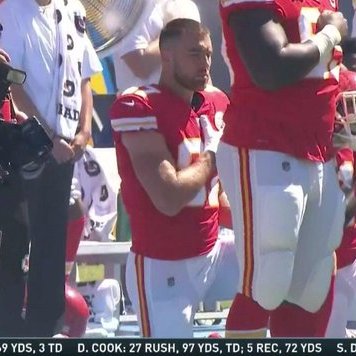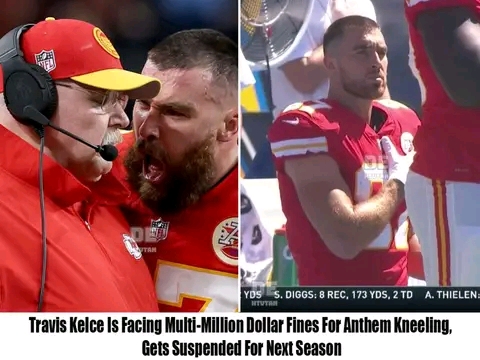BREAKING NEWS
Travis Kelce Receives 3-Game Suspension for Next Season Coupled with $10 Million Fine

In a stunning development, Kansas City Chiefs star tight end Travis Kelce is facing multi-million dollar fines and a suspension for the entire next NFL season after repeatedly kneeling during the national anthem. The NFL’s decision marks a significant escalation in the league’s handling of player protests and has sparked intense debate among fans, players, and commentators.
Travis Kelce, known not only for his exceptional skills on the field but also for his charismatic personality, has been a prominent figure in the NFL for years. Recently, Kelce began kneeling during the national anthem as a form of protest against racial injustice and police brutality, joining a movement that has seen varying degrees of participation and backlash across the league.
Despite receiving warnings from the NFL and his team, Kelce continued his protests throughout the season. In response, the NFL has imposed severe penalties, including multi-million dollar fines and a suspension for the upcoming season. The league cited violations of its conduct policy, emphasizing that players are expected to adhere to the rules and respect the national anthem protocol.
The NFL has long been at the center of the debate over anthem protests. Initially criticized for not supporting players’ rights to protest, the league has attempted to balance the interests of players, fans, and sponsors. However, Kelce’s case represents one of the most stringent disciplinary actions taken against a player for anthem protests, signaling a potential shift in the league’s approach.
In a statement, the NFL said, “While we respect the rights of our players to express their views, we also have guidelines that govern conduct during the national anthem. The league’s policy is designed to ensure respect for the anthem and unity among all participants. Mr. Kelce’s actions, despite repeated warnings, have violated these guidelines, necessitating disciplinary action.”
The reaction to the NFL’s decision has been polarizing. Supporters of the suspension argue that athletes, as public figures, have a responsibility to follow the rules and respect national symbols, especially during events that are seen as unifying moments. They believe the league has the right to enforce its policies and that Kelce’s continued protests disrupted team unity and the fan experience.
Conversely, critics argue that the punishment is excessively harsh and infringes on Kelce’s right to free expression. Many see his kneeling as a peaceful and powerful statement against systemic injustice, leveraging his platform to draw attention to critical social issues. They argue that the NFL’s actions stifle players’ voices and discourage them from advocating for meaningful change.
The suspension and fines will undoubtedly have a significant impact on Kelce and the Kansas City Chiefs. Kelce, a key player for the team, has been instrumental in their recent successes, including multiple playoff runs and a Super Bowl victory. His absence for the entire next season will leave a considerable gap in the Chiefs’ offense and could affect their overall performance.
Financially, the multi-million dollar fines will also be a substantial burden. While Kelce has earned considerable income through his career and endorsements, the fines represent a significant penalty and send a clear message about the league’s stance on protest-related conduct.
This situation reignites the ongoing conversation about the role of athletes in social and political activism. As sports figures increasingly use their platforms to highlight social issues, leagues and teams continue to grapple with how to manage these expressions. The NFL, in particular, has faced challenges in navigating this terrain, attempting to balance the interests of various stakeholders while maintaining a unified front.
The suspension of Travis Kelce adds another layer to this complex issue, highlighting the tension between personal expression and organizational rules. It raises questions about the extent to which athletes should be able to use their visibility to advocate for causes and the role of professional sports leagues in regulating such actions.
The NFL’s decision to impose fines and suspend Travis Kelce for his anthem kneeling protests marks a significant moment in the intersection of sports and social activism. As the league enforces its policies, the broader debate about freedom of expression and the role of athletes in advocating for social justice continues to evolve. The repercussions of this decision will likely resonate beyond the football field, influencing future actions by both players and the league in addressing critical societal issues












